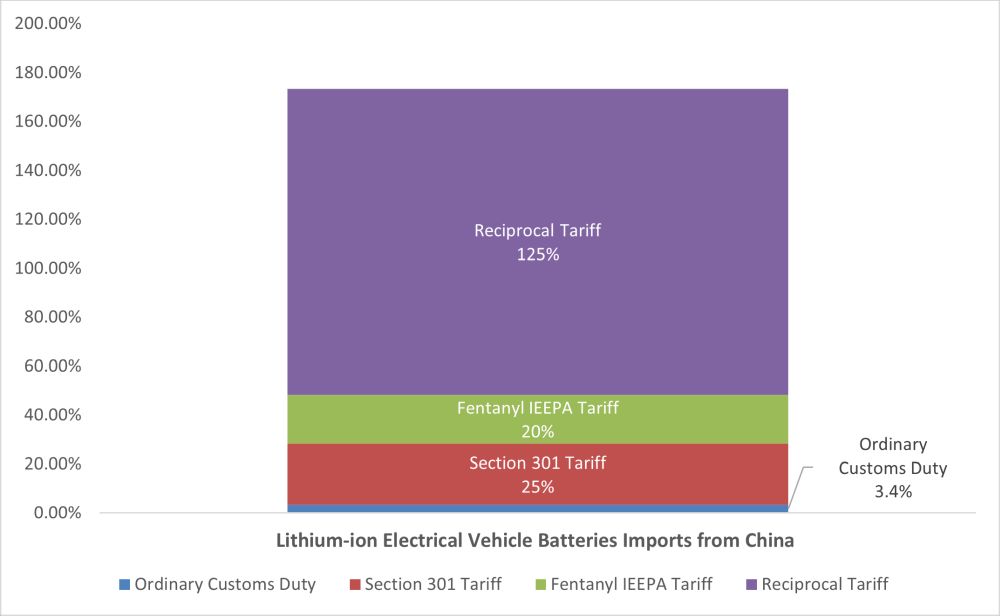- within Environment topic(s)
On April 2, 2025, President Donald Trump issued an executive order (Reciprocal Tariffs EO) imposing a 10% baseline reciprocal tariff on nearly all US trading partners, effective April 5, and an additional reciprocal tariff on 57 countries, effective April 9.1 As WilmerHale previously reported, President Trump invoked the International Emergency Economic Powers Act (IEEPA) to justify the tariffs; this 1977 statute had never been used to impose tariffs prior to this second Trump term.
As initially announced on April 2, seven of the United States' top 10 trading partners were among the 57 countries facing an additional reciprocal tariff.2 The total reciprocal tariff rates (including the baseline tariff and the additional tariff) for each of these trading partners were 34% for China, 20% for the European Union, 46% for Vietnam, 32% for Taiwan, 24% for Japan, 27% for India and 26% for South Korea.3
There have been several changes to the Reciprocal Tariffs EO since April 2.
China: The United States and China have engaged in a cycle of retaliation and counter-retaliation in the week since President Trump imposed the initial reciprocal tariff. Specifically:
- On April 4, China responded to President Trump's initial action by announcing a 34% tariff on all imported goods originating from the United States.
- On April 8, President Trump responded to China's action by increasing the reciprocal tariff on Chinese goods to 84%, effective April 9.4
- On April 9, China responded again, raising the tariff on US goods to 84%, effective April 10.
- On April 9, President Trump countered China's action by increasing the reciprocal tariff on Chinese goods to 125%, effective April 10.5
- On April 11, China responded again, raising the tariff on US goods to 125%, effective April 12.6
Other Countries (Except Canada and Mexico): On the same day that President Trump increased the China reciprocal tariff to 125%, he suspended the country-specific reciprocal tariff on all other countries for a period of 90 days, until July 8, 2025.7 As a result, all countries other than China, Canada, Mexico and "Column 2" countries such as Russia and North Korea will be subject only to the 10% baseline tariff for the time being.
Canada and Mexico: As WilmerHale reported in our prior alert, the fentanyl/migration IEEPA orders remain in effect, and the reciprocal tariffs do not apply to Canada or Mexico. Thus:
- The rate of duty for USMCA-originating goods remains at 0%.
- The rate of duty for non-USMCA-originating goods remains at 25%.
- The rate of duty for non-USMCA-originating energy or energy resources and potash imported from Canada remains at 10%
As WilmerHale also previously reported, the reciprocal tariffs are additive, meaning they apply in addition to most existing tariffs.8 This is having a particularly significant impact on the tariffs applicable to China. For example, lithium-ion electrical vehicle batteries imported from China are now subject to the following tariffs:9

According to the Trump Administration, more than 75 countries have reached out to negotiate with the United States on trade. Kevin Hassett, the Director of the National Economic Council in the White House, said that 15 of these countries have made "explicit offers." Mr. Hassett added that the Administration is setting up "a very orderly process" to prioritize negotiations with certain countries, though he did not describe the process or name the countries.
Footnotes
1. Regulating Imports With a Reciprocal Tariff To Rectify Trade Practices That Contribute to Large and Persistent Annual United States Goods Trade Deficits, 90 Fed. Reg. 15041 (Apr. 7, 2025), available here.
2. The other three top trading partners are Canada, Mexico and the United Kingdom. The April 2 announcement did not include Canada and Mexico, and the United Kingdom was subject only to the 10% baseline tariff.
3. Id.
4. Amendment to Reciprocal Tariffs and Updated Duties as Applied to Low-Value Imports From the People's Republic of China (Apr. 8, 2025), available here; "CSMS # 64687696 – UPDATED GUIDANCE – Reciprocal Tariffs on Goods of China, April 9, 2025, Effective Date," US Customs and Border Protection (Apr. 8, 2025), available here.
5. Modifying Reciprocal Tariff Rates to Reflect Trading Partner Retaliation and Alignment (Apr. 9, 2025), available here.
6. See https://gss.mof.gov.cn/gzdt/zhengcefabu/202504/t20250411_3961823.htm.
7. Id.
8. The reciprocal tariffs do not apply to (1) all articles subject to IEEPA's exceptions under 50 U.S.C. 1702(b); (2) all articles and derivatives of steel and aluminum subject to Section 232 duties; (3) all automobiles and automotive parts subject to Section 232 duties; (4) copper, pharmaceuticals, semiconductors, lumber articles, certain critical minerals, and energy and energy products; (5) all articles from a trading partner subject to Column 2 of the Harmonized Tariff Schedule of the United States (HTSUS) (e.g., Russia, North Korea); or (6) all articles that may become subject to duties pursuant to future Section 232 actions.
9. "Notices: Chapter 85," available here; Notice of Modification: China's Acts, Policies and Practices Related to Technology Transfer, Intellectual Property and Innovation, 89 Fed. Reg. 76581 (Sept. 18, 2024), available here.
The content of this article is intended to provide a general guide to the subject matter. Specialist advice should be sought about your specific circumstances.






